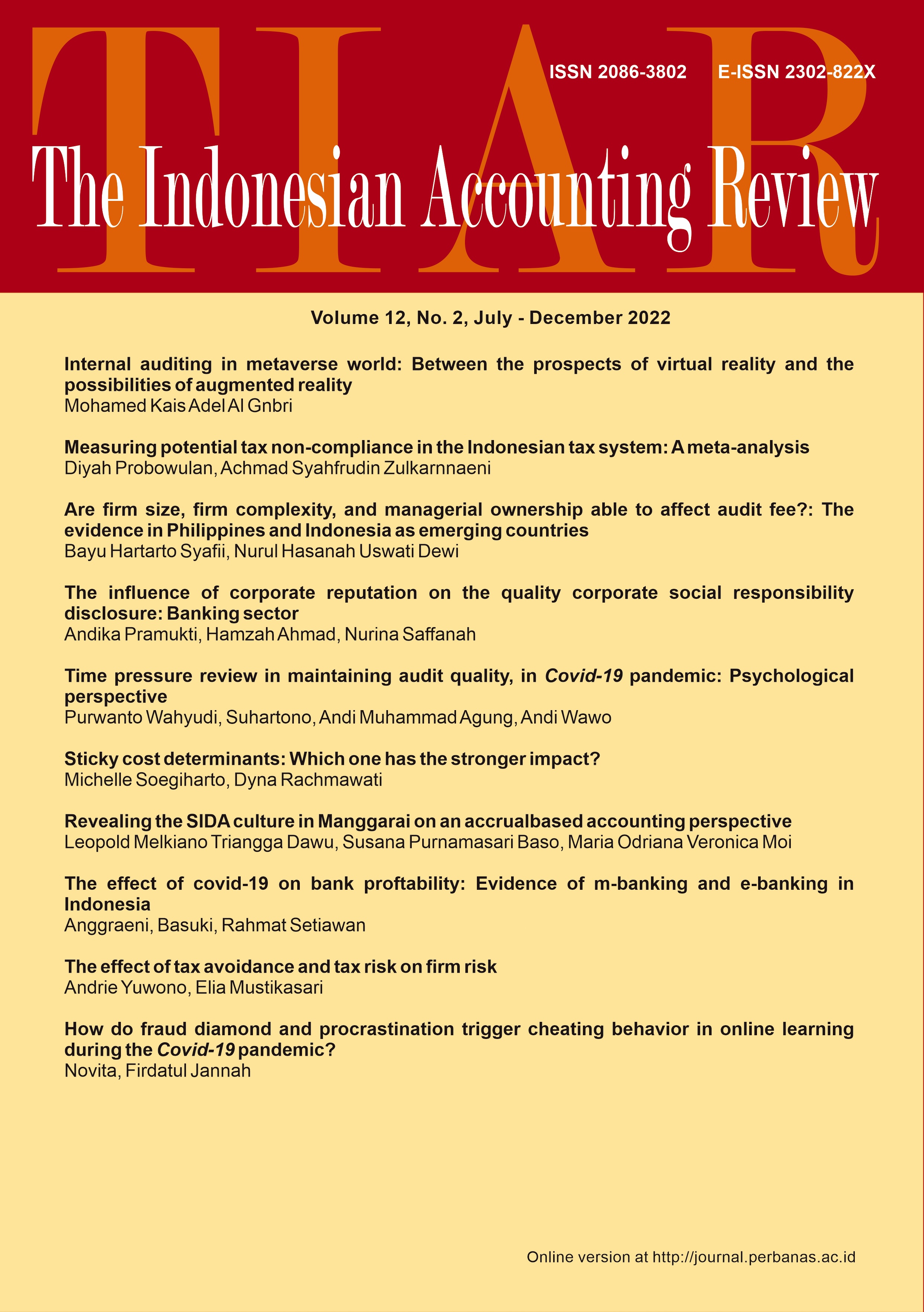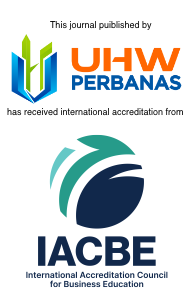How do fraud diamond and procrastination trigger cheating behavior in online learning during the Covid-19 pandemic?
DOI:
https://doi.org/10.14414/tiar.v12i2.2922Keywords:
Online learning, Fraud diamonds, Procrastination, Student cheating behaviourAbstract
The Covid-19 pandemic that hit Indonesia has changed the pattern of the learning system from face-to-face in the classroom to online learning. In practice, the online learning system utilizes information technology, which raises not only effectiveness, but also new challenges. One of the challenges of the online learning system is the student cheating behavior. This study aims to determine the effect of the fraud diamond dimensions, which consist of pressure, opportunity, rationalization, and capability,
and procrastination on the detection of student cheating behavior. This research is a quantitative research. The data used is primary data in the form of questionnaires. The respondents of this study are college students at LLDIKTI Region III DKI Jakarta. The data consists of 400 sample students. Data testing is carried out using STATA Version 14.2. The results of this study indicate that the fraud diamond dimensions consisting of pressure, opportunity, rationalization, and capability have a positive effect on the detection of student cheating behavior. Procrastination also has a positive effect on the detection of student cheating behavior.
References
Amalia, U. T., & Nurkhin, A. (2019). Dimensi Diamond Fraud dan Penggunaan Smartphone Terhadap Academic Fraud Dengan Religiusitas Sebagai Variabel Moderasi. Economic Education Analysis Journal (EEAJ), 8(1), 1–17.
Angeline, Kristanto, S. B., & Subagyo. (2020). Survei Kecurangan Akademik Pada Mahasiswa Program Studi Akuntansi Subagyo Pendahuluan. 3(Oktober), 480–497.
Arifah, W., Setiyani, R., Pd, S., Arief, S., Pd, S., & Sc, M. (2018). Pengaruh Prokrastinasi, Tekanan Akademik, Religiusitas, Locus of Control Terhadap Perilaku Ketidakjujuran Akademik Mahasiswa Pendidikan Akuntansi Unnes. Economic Education Analysis Journal, 7(1), 106–119.
Artani, K. T. B., & Wetra, I. W. (2017). Pengaruh Academic Self Efficacy Dan Fraud Diamond Terhadap Perilaku Kecurangan Akademik Mahasiswa Akuntansi Di Bali. Jurnal Riset Akuntansi, 7(2), 123–132.
Billy, B., Andrianus, A., Yuliati, R., & Adelina, Y. E. (2019). Kecurangan Akademik Pada Mahasiswa Akuntansi Berdasarkan Perspektif Fraud Diamond. Ekspansi: Jurnal Ekonomi, Keuangan, Perbankan Dan Akuntansi, 11(2), 157–178. https://doi.org/10.35313/ekspansi.v11i2.1346
Darmayanti, N., Rosyida, I. A., & Irawan, G. A. (2020). Pengaruh Dimensi Fraud Diamond Terhadap Perilaku Kecurangan Akademik Mahasiswa Program studi Akuntansi. J-MACC, Journal of Management and Accounting, 3(2), 41–54.
Fadri, N., & Khafid, M. (2018). Peran Kecerdasan Spiritual Memoderasi Pengaruh Dimensi Fraud Diamond Dan Self-Efficacy Terhadap Kecurangan Akademik. Economic Education Analysis Journal, 7(2), 430–448.
Fransiska, I. S., & Utami, H. (2019). Perilaku Kecurangan Akademik Mahasiswa: Perspektif Fraud Diamond Theory. Jurnal Akuntansi Aktual, 6(2), 316–323. https://doi.org/10.17977/um004v6i22019p316
J. Coonoly Becker, Paula L, dan J. M. (2006). Using the Business Fraud Triangle to Predict Academic Dishonesty Among Business Students. Academic of Educational Leadership, 10, 37.
Lubis, H., Ramadhani, A., & Rasyid, M. (2021). Stres Akademik Mahasiswa dalam Melaksanakan Kuliah Daring Selama Masa Pandemi Covid 19. 10(1), 31–39. https://doi.org/10.30872/psikostudia
Murdiansyah, I., Sudarman, M., & Nurkholis. (2017). Pengaruh dimensi fraud diamond terhadap perilaku kecurangan akademik. Jurnal Akuntansi Aktual, 4(2), 121–133.
Bachtiyar, Nurfuad M. (2020). Analisis Pengaruh Dimensi Fraud Diamond Terhadap Kecurangan Akademik Dengan Religiusitas Sebagai Variabel Moderasi. Journal of Chemical Information and Modeling, 53(9), 1689–1699.
Nurkhin, A., & Fachrurrozie. (2018). Analisis Pengaruh Dimensi Fraud Diamond Terhadap. 1(1), 1–12.
Prasetyo, I., & Handayani, N. S. (2019). Prokrastinasi Akademik Dan Kecurangan Akademik Pada Mahasiswa Yang Kuliah Sambil Bekerja. Jurnal Psikologi, 12(1), 22–30. https://doi.org/10.35760/psi.2019.v12i1.1913
Sadikin, A., Hamidah, A., Pinang, K., Jl, M., Ma, J., Km, B., Indah, M., Jaluko, K., Kode, K. M., & Indonesia, P. (2020). Pembelajaran Daring di Tengah Wabah Covid-19 ( Online Learning in the Middle of the Covid-19 Pandemic). 6(1), 214–224.
Sihombing, M., & Budiartha, I. K. (2020). Analisis Pengaruh Fraud Triangle Terhadap Kecurangan Akademik (Academic Fraud ) Mahasiswa Akuntansi Universitas Udayana. E-Jurnal Akuntansi, 30(2), 361. https://doi.org/10.24843/eja.2020.v30.i02.p07
Sugiyono. (2017). Metodologi Penelitian & Pengembangan.
Wahidin, A. N., Asse, A., & Bulutoding, L. (2020). Pengaruh Dimensi Fraud Triangle Terhadap. Islamic Accounting and Finance Review, 1(1), 40–58.
Wattimena, E. P. (2015). Hubungan antara perfeksionisme dengan prokrastinasi akademik dalam menyelesaikan skripsi pada mahasiswa di fakultas psikologi.
Wicaksono, L. (2017). Prokrastinasi akademik mahasiswa. 2, 67–73.
Wolfe, D. T., & Hermanson, D. R. (2004). The Fraud Diamond : Considering the Four Elements of Fraud. 12, 38–42.
Zamzam, I., Mahdi, S., & Ansar, R. (2017). Pengaruh diamond fraud dan tingkat religiuitas terhadap kecurangan akademik (studi pada mahasiswa S-1 di lingkungan perguruan tinggi se kota Ternate). Akuntansi Peradaban, 3, 1–24.
Downloads
Additional Files
Submitted
Published
How to Cite
Issue
Section
License
Copyright (c) 2022 The Indonesian Accounting Review

This work is licensed under a Creative Commons Attribution-NonCommercial 4.0 International License.

















